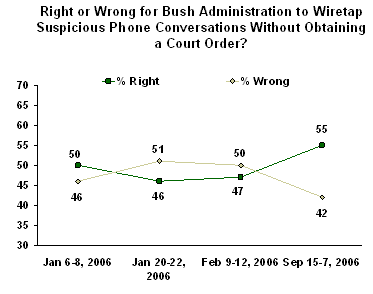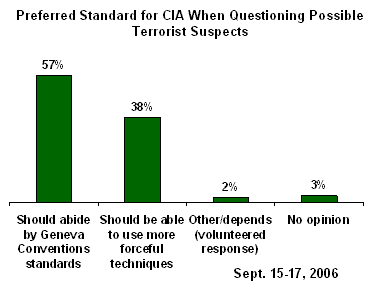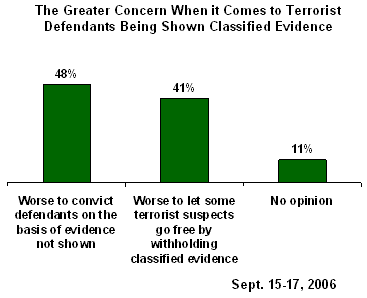GALLUP NEWS SERVICE
PRINCETON, NJ -- President George W. Bush is eager for Congress to endorse his policies on wiretapping and treatment of detainees before the November elections so the GOP can showcase its national security strategy to voters. After months of criticism from the left over his more aggressive anti-terrorism measures, Bush now faces resistance from a growing number of Republicans who are concerned about the possible impact these policies could have on the treatment of American prisoners of war.
American public opinion lies somewhere between the Bush administration's plea for stronger legal tools in the fight against terrorism on the one hand, and the competing concerns of his critics concerning national security, civil liberties and international law on the other.
The latest USA Today/Gallup Poll, conducted Sept. 15-17, tests public support for three of the primary anti-terrorism policy matters under consideration in Congress this week. Of these, Americans back Bush on one, back his opponents on the other, and are closely divided on the third.
Yes to Eavesdropping
More than half of Americans (55%) agree with the Bush administration's policy of wiretapping suspicious telephone conversations between a party in the United States and an international party without a court order. Public support for this has increased since earlier this year when it was revealed that the administration was already employing this technique.

No Exceptions to Geneva Conventions
While the Pentagon recently affirmed that all detainees held by the U.S. military should be handled according to the Geneva Conventions standards for humane treatment of prisoners, President Bush has sought more leeway for the way CIA must handle the terrorist suspects under its watch. Senator John McCain and others have expressed deep concern that such leeway could give the green light to some nations to loosen their adherence to the Geneva Conventions and jeopardize the well-being of captured U.S. troops.
The White House is currently negotiating with Republican leaders to strike a compromise. But Americans' gut reaction to the original Bush position is a negative one. A solid majority of Americans, 57%, say that when interrogating prisoners suspected of links to terrorism, the CIA should have to abide by the same Geneva Conventions standards that apply to the U.S. military. About four in ten (38%) disagrees saying the CIA should be able to use more forceful techniques. The full wording for this question is shown in the tables at the end of this report.

Mixed Reaction to Secret Evidence
The Bush administration also argues that certain "high-value detainees," such as suspected al-Qaeda terrorist leader Khalid Sheik Mohammed, should not be allowed to see classified evidence against them when brought to trial, out of concern that their review of that evidence would pose a national security risk. Critics of this policy point to the need to maintain the constitutional tenets of a fair trial, even for terrorist suspects.
The public shows no clear consensus on this issue. Close to half of Americans, 48%, take the opposing view of the government's, saying that convicting defendants on the basis of evidence they have never seen is more troubling than the alternative. Slightly fewer, 41%, agree with the administration's point, saying that letting some terrorist suspects go free rather than disclosing sensitive evidence would be worse. The full wording for this question is also provided at the end of this report.

Partisan Confusion
Democrats are uniformly opposed to all three of the Bush administration's anti-terrorism measures tested in the new poll. Republicans, on the other hand, show some ambivalence consistent with the fact that their own party leaders are at odds. The so called Warren-McCain-Graham bill, sponsored by three of the most high profile Republicans in the Senate and picking up more Republican supporters in the past few days, would temper the administration's policies dealing with the treatment of detainees.
Perhaps as a result, only 44% of Republicans agree with the administration's positions on secret evidence, saying classified evidence should be withheld from terrorist defendants. Also, just 44% agrees with the Bush position on CIA interrogation techniques, saying the CIA should not have to comply with the Geneva Conventions.
At the same time, the vast majority of Republicans (86%) believe the Bush policy on wiretapping phone conversations involving suspected terrorists without a court order is the right thing to do.
|
Republicans Reaction to Bush Anti-Terrorism Policies |
|||
|
Wiretapping |
Secret Evidence |
CIA Interrogations |
|
|
% |
% |
% |
|
|
Agree with Bush |
86 |
44 |
44 |
|
Disagree with Bush |
13 |
46 |
49 |
There is a substantial gap in views between Republicans and Democrats on the wiretapping question: 86% of Republicans support it compared with only a third of Democrats. However, as a result of the Republicans' internal fissure on the detainee issues, there is little difference between Republicans and Democrats when it comes to using secret evidence in terrorist trials and setting standards for CIA interrogations.
|
Percentage Favoring Bush Administration Position |
|||
|
Wiretapping |
Secret Evidence |
CIA Interrogations |
|
|
% |
% |
% |
|
|
Republicans |
86 |
44 |
44 |
|
Independents |
50 |
41 |
35 |
|
Democrats |
33 |
39 |
35 |
Survey Methods
These results are based on telephone interviews with a randomly selected national sample of 1,005 adults, aged 18 and older, conducted Apr. 10-13, 2006. For results based on this sample, one can say with 95% confidence that the maximum error attributable to sampling and other random effects is ±3 percentage points. In addition to sampling error, question wording and practical difficulties in conducting surveys can introduce error or bias into the findings of public opinion polls.
As you may know, the Bush administration has been wiretapping telephone conversations between U.S. citizens living in the United States and suspected terrorists living in other countries without getting a court order allowing it to do so. Do you think the Bush administration was right or wrong in wiretapping these conversations without obtaining a court order?
|
Right |
Wrong |
No opinion |
||
|
% |
% |
% |
||
|
2006 Sep 15-17 |
55 |
42 |
3 |
|
|
|
|
|
||
|
2006 Feb 9-12 ^ |
47 |
50 |
3 |
|
|
2006 Jan 20-22 ^ |
46 |
51 |
3 |
|
|
2006 Jan 6-8 |
50 |
46 |
4 |
|
|
|
|
|
||
|
^ |
Asked of a half sample. |
|||
As you may know, in the U.S. legal system the government is required to show defendants the evidence it has against them. In some terrorism trials, the government believes that showing defendants certain evidence may put American lives in danger. In your view, which would be worse - [ROTATED: convicting defendants of terrorism based on evidence they are never shown, (or) having some terrorism suspects go free because the government chooses to withhold evidence rather than show it to the defendant]?
|
Convicting defendants on evidence they are never shown |
|
|
|
|
% |
% |
% |
|
|
2006 Sep 15-17 |
48 |
41 |
11 |
When interrogating prisoners, members of the U.S. military are required to abide by the Geneva Convention standards which prohibit the humiliating and degrading treatment of prisoners. When the CIA or Central Intelligence Agency questions suspects whom they believe to have information about possible terror plots against the United States, do you think - [ROTATED: they should have to abide by the same Geneva Convention standards that apply to the U.S. military (or) they should be able to use more forceful interrogation techniques than the Geneva Convention standards that apply to the U.S. military]?
|
Abide by Geneva Convention standards |
|
|
|
|
|
% |
% |
% |
% |
|
|
2006 Sep 15-17 |
57 |
38 |
2 |
3 |